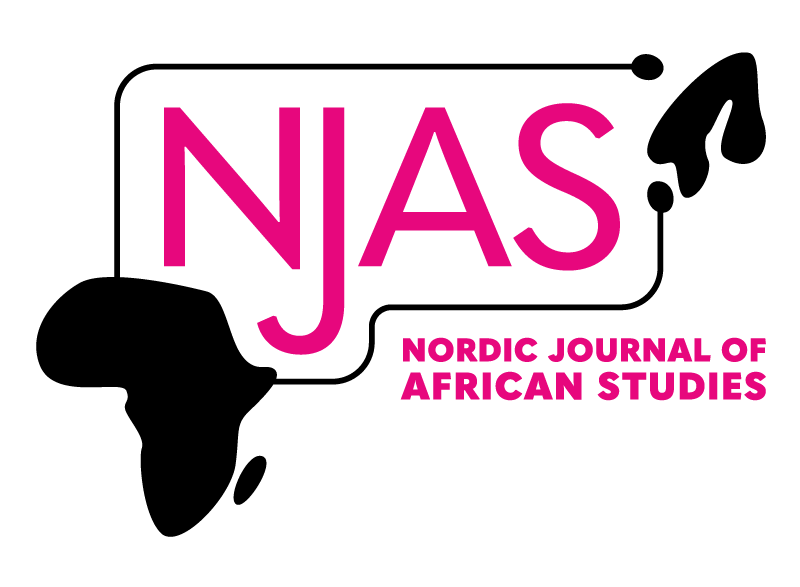Published 2025-03-31
Keywords
- Ewe language,
- cloth names,
- Ewe names,
- naming practices,
- onomastics
Copyright (c) 2025 Pascal Kpodo, Cynthia Selase Aku Mallet

This work is licensed under a Creative Commons Attribution 4.0 International License.
How to Cite
Abstract
The main aim of this paper is to explore the sociolinguistic significance of cloth names among the Ewe people. Additionally, the study investigates whether the use of cloth names as communicative modes is still a vital linguistic form in this group. The study utilized a sequential mixed-methods design. Initial data were collected through interviews with twelve purposively sampled female participants: four cloth sellers, four elderly women, and four young women. The native speaker intuitions of the researchers were also used in the initial data set. A second set of data was collected through a fieldworker-administered survey. In this survey, 129 women from the Anlo community and 164 women from the Eʋedome community responded to questions aimed at establishing the vitality and distribution of cloth name language using the Apparent Time Hypothesis. The study effectively sheds light on how cloth names serve not only as functional referential labels but also as carriers of profound social, cultural, and communicative significance. The study finds that although cloth names are relatively more popular among the Eʋedome people, their communicative use is more vibrant among the Anlo people. The paper concludes that the communicative use of cloth names is still vital among the Ewe, at least to some extent.
References
- Abdikhalikovna, Khayitova Feruza. 2020. “Principles of Toponyms (Place Names) Classifications.” International Journal of Multicultural and Multireligious Understanding 7 (6): 174– 177. Retrieved from https://ijmmu.com/index.php/ijmmu/article/view/1738
- Agbedor, Paul. 1991. “What Is in a Name?” Working Papers of the Linguistics Circle 10 (1): 39–47. Retrieved from https://journals.uvic.ca/index.php/WPLC/article/view/5076
- Agyekum, Kofi. 2006. “The Sociolinguistic of Akan Personal Names.” Nordic Journal of African Studies 15 (2): 206–235
- Ameevor, Phillips K. M. 1987. Ŋkɔwò Ɖe? Ghana Publishing Corporation.
- Aziaku, Vincent E. 2016. A Linguistic Study of Ewe Animal Names Among the Ewe of Ghana. Rüdiger Köppe.
- Berkes, Enrico, Ezra Karger, and Peter Nencka. 2023. “The Census Place Project: A Method for Geolocating Unstructured Place Names.” Explorations in Economic History 82: 101424. Retrieved from https://www.sciencedirect.com/science/article/pii/S0014498322000559
- Egblewogbe, E. Y. 1975. Games and Songs as Education Media. Ghana Publishing Corporation.
- Gilbert, Michelle. 2009. “Names, Cloth and Identity: A Case from West Africa.” In Media and Identity in Africa, edited by Kimani Njogu and John Middleton, 226–244. Edinburgh University Press.
- Hammersley, Martyn, and Paul Atkinson. 1995. Ethnography: Principles in Practice. 2nd ed. Routledge.
- Jackson, Richard H. 2023. “Place Names of the Mormon West: Religion, Heritage, and Idiosyncrasy.” In Perspectives on Latter-day Saint Names and Naming Practices, edited by Dallin D. Oaks, Paul Baltes, and Kent Minson, 21–41. Routledge.
- Johnson, R. Burke, Anthony J. Onwuegbuzie, and Lisa A. Turner. 2007. “Toward a Definition of Mixed Methods Research.” Journal of Mixed Methods Research 1 (2): 112–133.
- Kpodo, Pascal. 2014. Eʋe Ƒe Gbeɖiɖiwo Kple Wo Ŋuti Sewo. Teamworks Graphix.
- Kpodo, Pascal. 2017. “Vowel Height Agreement in Ewe.” Journal of Applied Linguistics and Language Research 4 (7): 206–216.
- Kpodo, P., S. A. C. Mallet, and K. G. Agbemehia. (2023). Linguistic Landscape of Ho Metropolis. Paper presented at the 15th Linguistics Association of Ghana Conference, Takoradi Technical University, Takoradi, Ghana, August 30–September 1, 2023.
- Kumassah, Agbotadua. 2009. The Migration Saga of The Anlo-Ewes of Ghana. No Publisher.
- Mamattah, Charles M. K. 1978. Ewes of West Africa Vol. 1: The Anlo Ewes and their Immediate Neighbours. Volta Research Publications.
- Milroy, Lesley, and Matthew Gordon. 2003. Sociolinguistics: Method and Interpretation. Blackwell.
- Ndlovu, Sambulo. 2023. Personal Names and Naming from an Anthropological-Linguistic Perspective. Springer Nature.
- Ollennu, Yvonne A. A., Francis T. Owulah, and Patience Obeng. 2022. “A Sociolinguistic Analysis of Cloth Names Among the Ga and Dangme People of Ghana.” Journal of Critical Studies in Language and Literature 3 (4): 36–53. https://doi.org/10.46809/jcsll.v3i4.161
- Poyatos, Fernando. 1983. “Language and Nonverbal Systems in the Structure of Face-To-Face Interaction.” Language & Communication 3 (2): 129–140.
- Sekyi-Baidoo, Yaw. 2019. Akan Personal Names. University of Ghana Press.
- Sekyi-Baidoo, Yaw. 2024. “The Commemorability Principle in Akan Personal Name Construction.” Genealogy 8 (2): 48. https://doi.org/10.3390/genealogy8020048
- Shigini, Gonga Peter, and Cosmas Gastor Mapunda. (2023). “A Morphological Analysis of Kemunasukuma Personal Names.” Linguistik Online 123 (5): 95–113.
- Willard, Michelle. 2004. “History of Research on African Factory-Printed Cloth and Current Approaches in the Field.” Textile Society of America Symposium Proceedings 447.
- Wolvengrey, Arok. 2021. “Plains Cree Personal Names.” Anthropological Linguistics 63 (1), 127–151. Retrieved from https://www.jstor.org/stable/27260575

